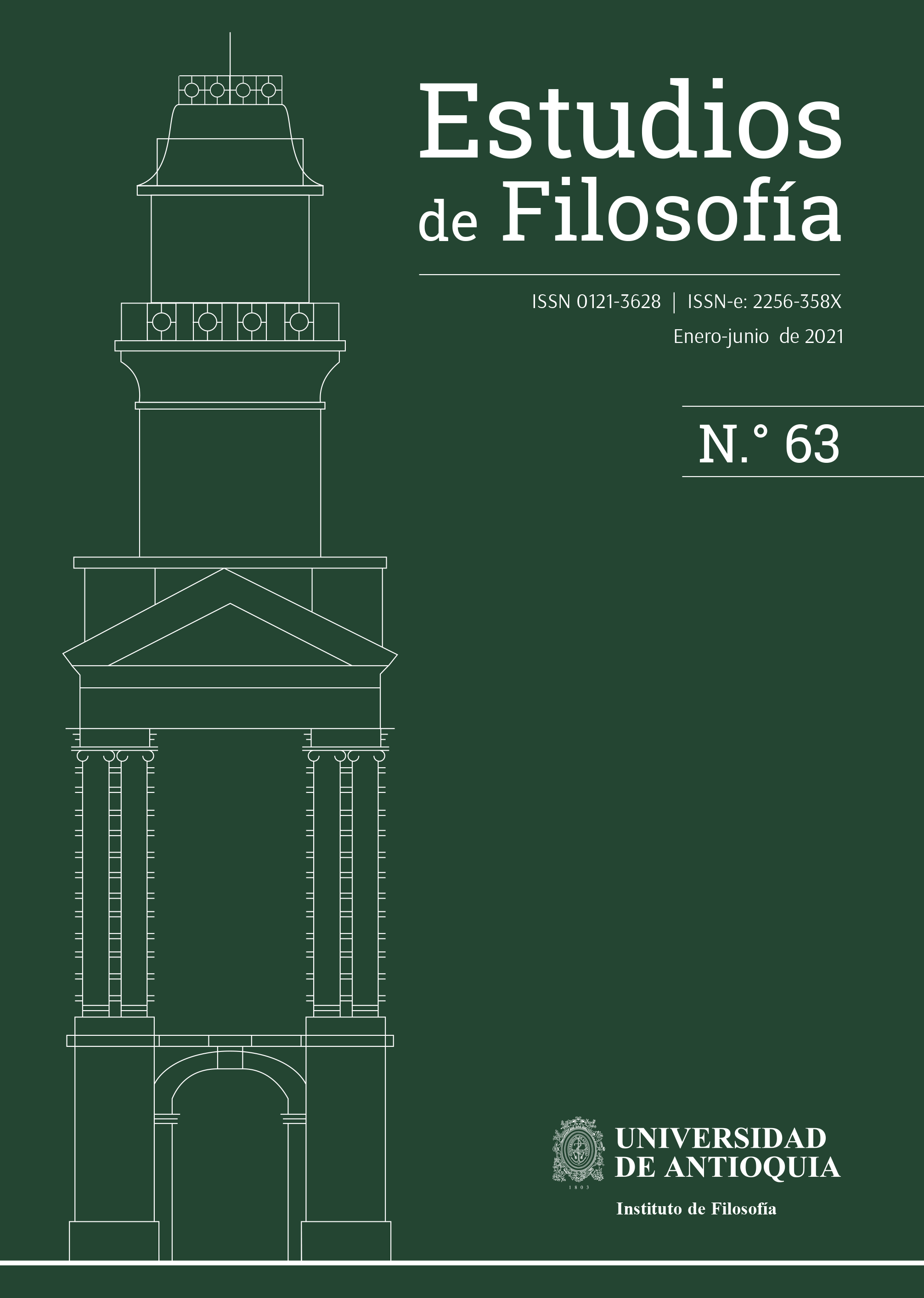Anti-Oedipus and Marxist feminism: towards a discussion
DOI:
https://doi.org/10.17533/udea.ef.n63a07Keywords:
capitalism, feminism, axiomatic, reterritorializationsAbstract
This article studies unexplored affinities between the theory of capitalism in Anti-Oedipus and some debates on social reproduction in Feminist Marxism. On the one hand, capitalism, with its movement towards the decoding of flows, tends to dissolve the family under deterritorialized movements. On the other, it presupposes an oedipal (and familiaristic) reterritorialization, for it separates kinship from relations of production, founding a historically specific split. The distinction between axiomatic and capitalist re-territorialization, in this context, appears as an adequate conceptual way to analyze the relation between family and capitalism in feminist-Marxist terms.
Downloads
References
Alliez, È. (1997). Questionnaire on Deleuze. Theory, culture and society, 14(2), 81-87.
Arruzza, C. (2014). Remarks on gender. Viewpoint Magazine. https://viewpointmag.com/2014/09/02/remarks-on-gender/
Arruzza, C. (2015). Las sin parte. Matrimonios y divorcios entre feminismo y marxismo. Sylone.
Artous, A. (1982). Los orígenes de la opresión de la mujer. Editorial Fontamara.
Bhattacharya, T. (2017). How not to skip class: Social reproduction of labor and the global working class. En T.
Bhattacharya (Ed.), Social reproduction theory (pp. 68-93). Pluto Press. https://doi.org/10.2307/j.ctt1vz494j.8
Braidotti, R. (1996). Nomadism with a difference: Deleuze’s legacy in a feminist perspective. Man and World, 29, 305-314. https://doi.org/10.1007/BF01248440
Braidotti, R. & Dolphijn, R. (Eds.) (2005). This Deleuzian century. Brill.
Buchanan, I. & Colebrook, C. (Eds.) (2000). Deleuze and feminist theory. Edinburgh University Press.
Dalla Costa, M. R. & James, S. (1975). El poder de la mujer y la subversión de la comunidad. Siglo XXI.
D’Emilio, J. (2006). Capitalismo e identidad gay. Nuevo Topo, 2, 50-71.
Deleuze, G. (2006). Derrames. Entre el capitalismo y la esquizofrenia. Anagrama.
Deleuze, G. & Guattari, F. (1972). L’anti-Oedipe. Capitalisme et schizophrénie. Editions du Minuit.
Delphy, C. (1985). Por un feminismo materialista. El enemigo principal y otros textos. La Sal. Dhruv J. (Ed.) (2009). Deleuze and Marx. Deleuze Studies (Volume 3). Edinburgh University Press.
Fraser, N. (2012). Can society be commodities all the way down? Polanyian reflections on capitalist crisis. Archive Ouverte de Sciences de l’Homme et la Societé, halshs-00725060f. https://halshs.archives-ouvertes.fr/halshs-00725060
Fraser, N. (2016). Contradictions of capital and care. New Left Review, 100, 99-117.
Fraser, N. & Jaeggi, R. (2018). Capitalism. A conversation in critical theory. Polity.
Hartmann, H. (1983). Un matrimonio mal avenido: hacia una unión más progresiva entre marxismo y feminismo. Fundación Rafael Campanas. http://www.fcampalans.cat/uploads/publicacions/pdf/88.pdf
Holland, E. (2013). Deleuze, Guattari and minor Marxism. https://doi.org/10.1057/9781137352835_7
Holland, E. (1999). Deleuze and Guattari’s Anti-Oedipus. Introduction to schizoanalysis. Routledge.
Patton, P. (2011). What is Deleuzian political philosophy? Crítica contemporánea. Revista de Teoría Politica, 1, 115-126.
Rubin, G. (1986). El tráfico de mujeres: notas sobre la «economía política» del sexo. Revista nueva antropología, 30, 95-145.
Sargent, L. (Ed.). (1981). Women and Revolution: A Discussion of the Unhappy Marriage of Marxism and Feminism. Black Rose Books.
Stark, H. (2017). Feminist Theory after Deleuze. Bloomsbury.
Vogel, L. (2013). Marxism and the Oppression of Women. Toward a Unitary Theory. Brill. https://doi.org/10.1163/9789004248953
Young, I. (1992). Marxismo y feminismo, más allá del matrimonio infeliz (una crítica al sistema dual). El cielo por asalto, 2(4), 43-69.
Thoburn, N. (2019). Deleuze, Marx y la política. Marat.
Žižek, S. (2003). ¿Lucha de clases o posmodernismo? Sí, por favor. En J. Butler, E. Laclau, & S. Žižek (Eds.). Contingencia, hegemonía y universalidad. Diálogos contemporáneos en la izquierda (pp. 105-132). Fondo de Cultura Económica.
Published
How to Cite
Issue
Section
Categories
License
Copyright (c) 2021 Facundo Nahuel Martín

This work is licensed under a Creative Commons Attribution-NonCommercial-ShareAlike 4.0 International License.
Authors who publish with this journal agree to the following terms:
1. The Author retains copyright in the Work, where the term "Work" shall include all digital objects that may result in subsequent electronic publication or distribution.
2. Upon acceptance of the Work, the author shall grant to the Publisher the right of first publication of the Work.
3. The Author shall grant to the Publisher a nonexclusive perpetual right and license to publish, archive, and make accessible the Work in whole or in part in all forms of media now or hereafter known under a Creative Commons Attribution-NoCommercia-ShareAlike (CC BY-NC-SA 4.0), or its equivalent, which, for the avoidance of doubt, allows others to copy, distribute, and transmit the Work under the following conditions: (a) Attribution: Other users must attribute the Work in the manner specified by the author as indicated on the journal Web site;(b) Noncommercial: Other users (including Publisher) may not use this Work for commercial purposes;
4. The Author is able to enter into separate, additional contractual arrangements for the nonexclusive distribution of the journal's published version of the Work (e.g., post it to an institutional repository or publish it in a book), as long as there is provided in the document an acknowledgement of its initial publication in this journal;
5. Authors are permitted, and Estudios de Filosofía promotes, to post online the preprint manuscript of the Work in institutional repositories or on their Websites prior to and during the submission process, as it can lead to productive exchanges, as well as earlier and greater citation of published work (see The Effect of Open Access). Any such posting made before acceptance and publication of the Work is expected be updated upon publication to include a reference to the Estudios de Filosofía's assigned URL to the Article and its final published version in Estudios de Filosofía.















